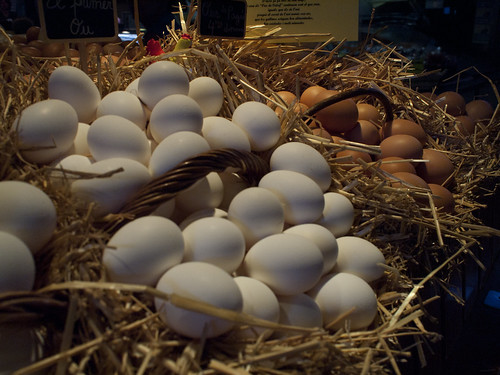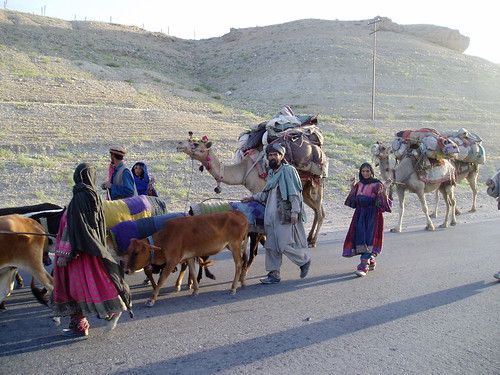22nd Sunday in Ordinary Time (B)
Picture: cc Steven Straiton
Sisters and brothers, I recently came across a story about a famous zoo, which had a star attraction. A gigantic male mountain gorilla. Unfortunately, this celebrity animal died suddenly. And, afraid that its patrons would stop visiting the zoo if a replacement was not found immediately, the management decided on a desperate measure. They dressed up one of their zookeepers in a gorilla suit. And convinced the poor man to sit in the dead animal’s enclosure during opening hours. With the promise that he would be given a big raise.
The man agreed. And the trick worked. Visitors didn’t seem to notice that their favourite gorilla had been replaced by a man in disguise. They continued to get excited by what they saw. And even tried, as they had done in the past, to persuade the gorilla to move by shouting and throwing things at it. Finally, the zookeeper decided that there was no harm in obliging his fans. So he stood up and started swinging from the bars of his enclosure. Which made the visitors even more excited. Encouraged by the positive response, the zookeeper swung even more enthusiastically. Unexpectedly, however, he lost his grip, and somehow landed in the enclosure next door. Which happened to be occupied by a lion.
Seeing the big cat, the zookeeper was paralysed with fear. The lion gave the fake gorilla a penetrating stare, and then started walking towards him. At which the poor zookeeper panicked. He threw up his arms and screamed at the top of his lungs. Help! Get me out of here! I’m a man, not a gorilla! But this only made the lion walk even faster. When it finally reached the zookeeper, the lion opened its mouth, full of sharp teeth, and made as if to take a bite. Then the zookeeper heard a voice coming from inside the lion. It said to him, Shut up, you fool! Or you’ll get us both fired!
The story is, of course, only a joke. Meant to make people laugh. But isn’t there also something sad and even tragic about it? Sad that a place that’s supposed to be filled with wonderfully wild animals should be reduced to exhibiting human impostors. Artificial beasts who only look dangerous and fierce on the outside. But, on the inside, are actually quite weak and powerless. And tragic that the people visiting such a place can’t even tell the difference.
There is also something sad and tragic in our Mass readings today. A similar reduction and distortion of something precious. Not a zoo this time. But a religion. Not wild animals. But religious practices. In the first reading, Moses presents the people of Israel with a set of laws and customs handed to him by God. A code of religious practice that is filled with power. For if the people observe them closely, these practices bring them life. Give them the power they need to enter and take possession of the land.
Even more than that, when carefully kept, these practices actually enable the people to experience the very presence of God in their midst. What great nation is there, Moses tells them, that has its gods so near as the Lord our God is to us whenever we call to him. Or, in the words of the responsorial psalm, the just–those who keep God’s law–will live in the presence of the Lord. The second reading adds one more aspect to this picture of what true religion looks like. And it has to do with how the poor are treated. Pure, unspoilt religion, in the eyes of God our Father is this: coming to the help of orphans and widows when they need it…
This is what authentic religion is meant to do for all those who practice it. First, it gives them power to take possession of the land. To keep themselves uncontaminated by the world. Second, it helps them to experience the presence of God. Third, it moves them to reach out and to care for the poor. For those most in need. Power, presence and poverty. Three striking characteristics of true religion. Three remarkable features that give authentic religious practice a certain wild, awe-inspiring, even dangerous, quality. Such as a majestic mountain gorilla, or a ferocious fully-grown lion, might have.
But here’s the tragedy. In the hands of the scribes and the Pharisees in the gospel, this originally awesome religion is reduced to a pale shadow of its former self. Distorted by legalistic interpretations, the law becomes nothing more than the strict observance of a set of meaningless human prescriptions. Practices that contain no power. Mediate no God-experience. Inspire no care for the poor. Which is why Jesus reserves such harsh words for the scribes and Pharisees. Calling them hypocrites. And applying to them the sharp accusation of the prophet Isaiah. This people honours me only with lip-service, while their hearts are far from me…
Much like those zoo animals in our story, the religion practiced by the scribes and the Pharisees looks good only on the outside. But, on the inside, it is actually very different. Useless. And what about us? What about our religious practice? Our experience, for example, of worship, when we come to church every Sunday. To what extent does our participation at Mass give us power to take possession of the world around us? Rather than to allow it to possess us. To what degree does our presence at this liturgy help us to uncover and to enjoy the presence of God when we leave this holy place? And how effectively does our weekly gathering for prayer move us to care for the many needy people around us?
I’m not sure how you feel about this, sisters and brothers. I know that many of us do take the liturgy seriously. Finding in it consolation and strength for our journey. Allowing it also to challenge us to go beyond our comfort zones for the sake of others. And yet, it remains true that some of us still think of our time here as the fulfilling an obligation. Something we wouldn’t do if we didn’t have to. And there are also those of us who still feel the need to offer others constant reminders to treat this place with the reverence and respect that is its due. To maintain a prayerful silence before Mass, for example. To dress appropriately. To switch off mobile devices. To try our best to participate fully and actively... What does all this tell us, sisters and brothers? If not that we still have some way to go as a parish to practice our religion the way it is meant to be practiced?
This challenge is something that can only be met if all of us do our part. Priests like me. As well as lay people like you. We all have a part to play, to help bring our experience of worship closer to the ideal that our readings present to us. It is not easy. We need God’s help. Which is why I find the words of our opening prayer so useful. God of might, giver of every good gift, put into our hearts the love of your name, so that by deepening our sense of reverence, you may nurture in us what is good…
Sisters and brothers, the true religion that is God’s gift to us in Christ is indeed something precious and awe-inspiring. It fills us with power. Draws us to poverty. And enables us to experience the presence of God. What must we do, you and I, as individuals and as a parish, to avoid reducing God’s religion to nothing more than a pitiful man in a ridiculous gorilla suit today?



